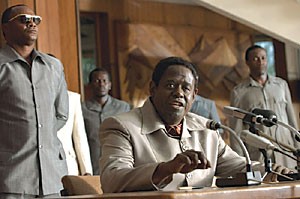Unless you have an exceptional amount of patience, “”The Last King of Scotland”” doesn’t really get interesting until the end of the movie. The beauty of this smart suspense thriller is not in the expressive way it portrays a war-torn African nation, but in the buildup of tension and horror between the two main characters, leading to an explosive climax at the end.
The movie does a wonderful job of the former as well. A partially fictionalized account of the brutal Ugandan dictatorship of Idi Amin in the ’70s, “”The Last King”” is at once an edge-of-your-seat thriller, a historical tribute and an art film striking in its use of cinematography, costume and set design.
From the start, director Kevin Macdonald does an astounding job of transporting us into Africa. The aboriginal Third World traditions of the natives, the harsh and forceful language and the luscious tropical landscape – all this is juxtaposed with the industrious city of Kampala, home of the president and the center of his decadent hypocrisy. While he is eating first-class meals with leaders all over the world and throwing extravagant parties, the people of his country are being violently murdered.
Amin (Forest Whitaker), who assumed leadership after a coup, is continually fighting against rebellious members of the old regime, brutally killing them off by the hundreds. At the same time, he blatantly lies to his people and international journalists about the situation in his country, painting a rosy picture that fools even many natives.
The protagonist, Dr. Nicholas Garrigan (James McAvoy), becomes a focal point of this chaos after attending a speech by the president in the village he has been working in as a medical
“”The Last King of Scotland””
Rating: R
Length: 123 min.
Production Company: Fox Searchlight
10/10
doctor. From Scotland, the unlikable and rambunctious Garrigan randomly decides to travel to Uganda for adventure, rather than helping its people.
After the president is injured in a nearby collision with a bull, the two become friends when Garrigan fixes up his hand. Shortly after, Amin whisks him away from the Third World village to become his personal physician and eventually his closest adviser.
One wants to slap the doctor in the face for his arrogance while he lets a time-bomb of a man tempt him with tremendous wealth, false power and beautiful women while a country deteriorates from the inside.
As Garrigan ignores the warnings of secret insurrectionist British officials and journalists, his quickly escalating relationship with the bipolar dictator spirals out of control. When the two almost get assassinated by revolutionary forces with machetes, Amin’s temper flares out of control and he calls everyone traitors, screaming at Garrigan along with them.
The doctor finally realizes that he is only a pawn in Amin’s plan to gain respect at any cost and will eventually be thrown away and killed if he so much as gives him bad advice. When he tells Amin he wants to leave, his normally friendly disposition instantly transfers into that of a desperately violent and extremely powerful madman.
The rest of the movie has the viewer wondering how far Amin will go to silence any and all traitors, and whether the naive anti-hero will be able to escape back home to Scotland, especially after he begins a sordid affair with Amin’s wife.
Whitaker’s interactions with the characters is astounding; he literally embodies the spirit of a deceitful and violent megalomaniac. His performance in the film is ultimately what makes it an enduring yet distressing work of cinematic art.









